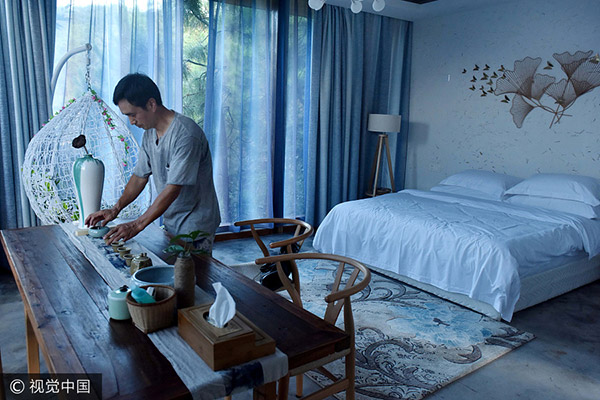Much more than just bed & breakfast
 |
|
A house owner cleans a room in Wuyi county, Zhejiang province, July 13, 2017. [Photo/VCG] |
B&B segment gives China's hospitality industry the power of sharing economy
Ensconcing herself on the windowsill, Zhang Qiuhua sipped champagne and drank in the sights of a picturesque and tranquil rural setting outside. Fluffy white clouds floated languidly in azure skies above the green hills. Her chirpy 8-year-old daughter played on the slide beside her king-size bed.
For once, life seemed blissful, a wonderful treasure; time appeared to stand still-and even the barks of dogs in the backyard sounded like part of the background shrill symphony led by cicadas in the bamboo forest that the wooden villa overlooked.
For accountant Zhang, the villa, a bed and breakfast, or B&B, facility in a bamboo village in Tonglu, a two-hour drive from Hangzhou, capital of Zhejiang province, was the perfect getaway after 12 consecutive days of stressful work. Far from the madding crowd as it were.
The three-room villa charges about 800 yuan ($121) per room on weekdays and 1,400 yuan on weekends. It is a price comparable to star hotels in Zhejiang.
"I booked the room four months in advance because B&B is so popular now that you've to book early," Zhang said.
The village boasts more than a dozen such B&Bs. All are doing roaring business.
"Summer is often the peak season for us, and we need to hire part-time housekeepers and cooks," said Huang Fenya, one of the B&B hostesses.
In recent years, however, the peak season extended beyond summer into other seasons, she said. The most popular bamboo villa with double king-size beds, which can host a large family, is fully booked until the end of the year.
"We are having more guests this year, and we expect there will be more next year as guests help promote our place through word of mouth," she said.
As the legitimacy of sharing economy as a growth-driver gains wide acceptance, B&B is fast becoming a popular option for Chinese tourists such as Zhang.
In August 2016, travel agency websites saw a spike in searches for "B&B" that surpassed "hotel".
Young couples and families are seeking affordable accommodation that can also pack in experiences beyond standard fare like hotels, hostel and conducted tours.
So, spare rooms at rural homes in tourist spots are getting converted into B&B units for visitors, who want to mingle with their hosts, make new friends, experience local culture and lifestyle, savor homemade food, and feel at home outside home.
Hosts, too, are happy playing as local tour guides or drivers.
According to a report by the China Hospitality Association, B&B facilities in China have surged 78 percent from 30,231 in 2014 to 53,852 by June-end, and are expected to surpass 55,000 by the year-end.
A stay at B&B could be for more than 12 hours. Some even pick their favorite B&B as venue for significant days such as anniversaries, birthdays, or even weddings, according to a CHA report, which surveyed more than 20,000 consumers across China.
Typical guests are those who travel a long distance to neighboring cities and villages frequently. They are usually married or going steady with partners. They would like to travel in pairs or in groups, and would focus more on feelings and experiences than cost, the CHA report said.
About 57.5 percent of guests at B&B are women; 52.5 percent are aged between 25 and 39; and about 52.4 percent expect the average cost of a Chinese B&B to be about 500 yuan per room/night, which is above the average spending at a budget hotel and equal to that of a four-star hotel in a typical second-tier city.
The trend of rising consumption among the increasingly affluent middle class is driving B&B growth in China, said Xie Yun, deputy head of the tourism and hospitality management faculty of Guangxi Normal University.
He compared China's B&B segment to "private banquets" in the dining industry. "As residents' purchasing power rises and consumption diversifies, it's not surprising that B&B is getting popular."
Agreed Yu Minliang, 23, a graduate student in Shanghai. He prefers B&Bs over other types of accommodation when traveling. "B&B meals are cooked by the host. Very often, vegetables are home-grown. The hosts share their garden harvest with you."
Yu said "sharing" marks almost every aspect of a B&B stay. Unlike hotels, B&B enables guests to be social.
"At B&B, you eat grapes from the vines in the backyard garden. Hosts and guests chat over a meal, and play with the pets like cats together. If you are not driving, fellow guests could give you a ride to nearby scenic spots," said Yu. In many ways, B&Bs in China offer much more than just bed and breakfast.
The B&B concept emerged in Europe centuries ago, and came to be known as places for travelers for paid overnight stay at a stranger's spare room, with breakfast thrown in for good measure.
In China, however, B&B is about entertainment, leisure, experiences, new friendships, and even social networking.
Chen Zhuo, head of Jinshe Hospitality Management Ltd, summed up the trend beautifully: More than the bed and the breakfast, most guests care for what happens between bedtime and departure after breakfast. And in China, much happens during that time, so B&Bs are thriving.

















